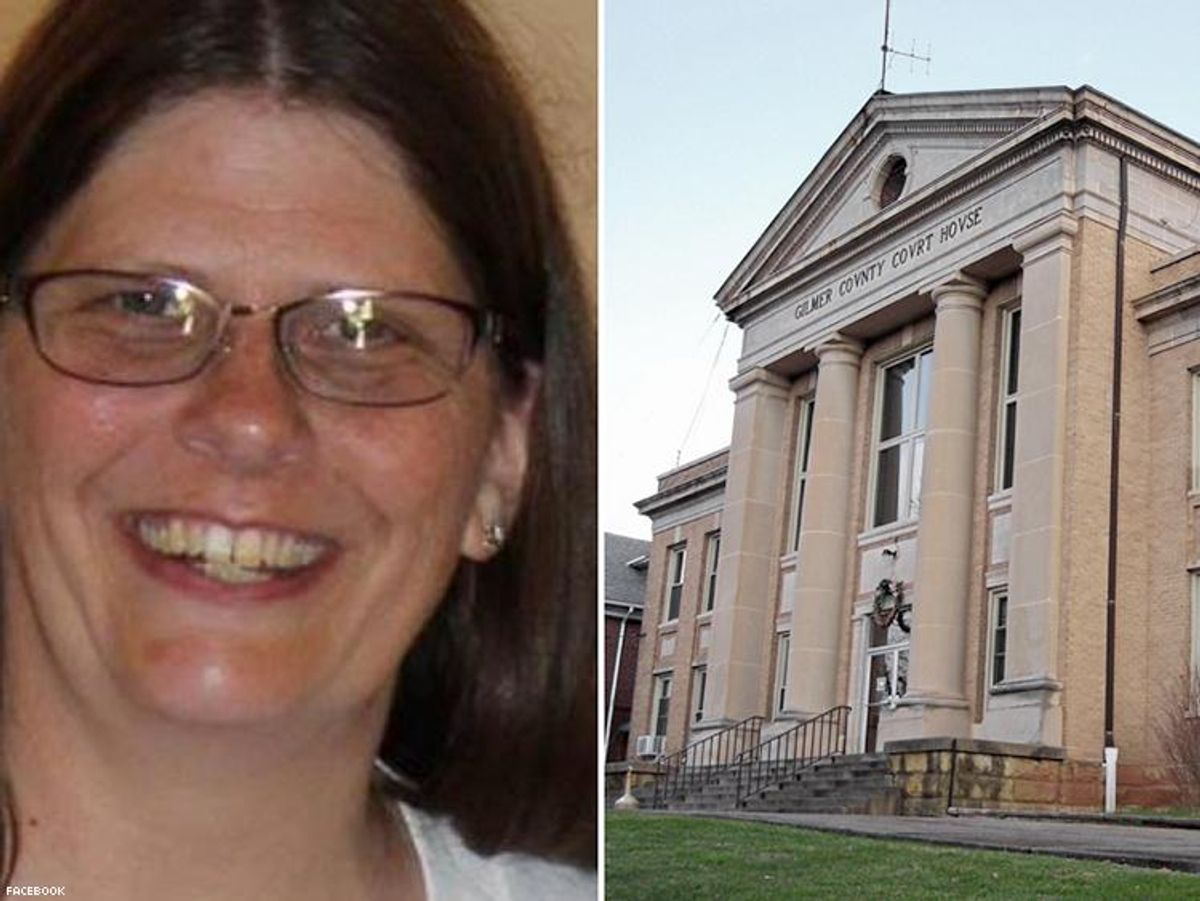Two women who applied for a marriage license in West Virginia this month say they got an antigay lecture along with it, as the deputy county clerk who processed their license called them an "abomination" and said God would judge them.
Samantha Brookover and Amanda Abramovich applied for their license at the Gilmer County Courthouse in Glenville in early February. The deputy who waited on them, Debbie Allen, yelled at them that their marriage was wrong, that no one in the county would perform their ceremony, that they were an "abomination" in the eyes of God, and that they would face his judgment, they told the Charleston Gazette-Mail.
"It just takes one person to remind you how closed-minded our world is," Brookover told the paper.
Allen and another deputy disputed the couple's account of the meeting. "We did not attack them," Allen said. "We did not yell at them. We were not aggressive with them. I felt I talked nicely to them." She said she did not use the word "abomination." The other deputy, Angela Moore, said she did not hear that word either, although she could not make out the entire conversation. They both said Allen kept her voice down.
Allen, however, did not deny that she told Brookover and Abramovich that their marriage was morally wrong and that God would judge them. "I just told them my opinion," she told the Gazette-Mail. "I just felt led to do that. I believe God was standing with me and that's just my religious belief."
Brookover's mother, Jill Goff, who was also present, said she complained to Gilmer County Clerk Jean Butcher, who said she believed as Allen does. In an interview with the newspaper, Butcher said that the upshot of the matter was that the couple got their license, "and that was the main thing."
But Allen's conduct, according to Americans United for Separation of Church and State, still "flagrantly violated" the women's constitutional rights. "By chastising the couple and expressing religious disapproval of their relationship and attempt to marry, the County violated the Equal Protection and Due Process Clauses of the Fourteenth Amendment as well as the Establishment Clause of the First Amendment," the organization said in a letter sent to Butcher and county commissioners Friday. "In order to bring the County Clerk's office into compliance with the Constitution, the office and its staff must refrain from conveying religious or antigay messages when processing marriage-license applications or performing other official functions."
Rev. Barry W. Lynn, executive director of Americans United, added in a press release, "It is both cruel and unacceptable for a government employee to berate anyone he or she serves in an official capacity. Even though Ms. Allen did not refuse to issue a license in this instance, she still deprived an innocent couple of their rights when she treated them like second-class citizens." Americans United gave Butcher 14 days to respond to the letter.
The incident added to concerns about West Virginia's Religious Freedom Restoration Act, passed by the House of Delegates last week and now pending in the Senate. It would allow any business or individual to cite religious objections as a legal defense for noncompliance with a state or municipal antidiscrimination law. The state does not cover sexual orientation or gender identity in its civil rights laws, but seven cities do. Also, in a bill allowing Uber to operate in the state, House members voted against requiring drivers to have a nondiscrimination policy regarding sexual orientation or gender identity. That bill has gone on to the Senate too.
The situation brings to mind the actions of Rowan County, Ky., Clerk Kim Davis, who confronted same-sex couples when denying them marriage licenses last summer. Davis eventually went to jail for defying a federal judge's order to comply with the law and issue licenses without discrimination. Since her release, deputies in her office have been serving same-sex couples, and late last year Kentucky's new governor issued an executive order taking clerks' names off licenses in all counties -- something Davis had requested as an accommodation of her religious beliefs.


















































































